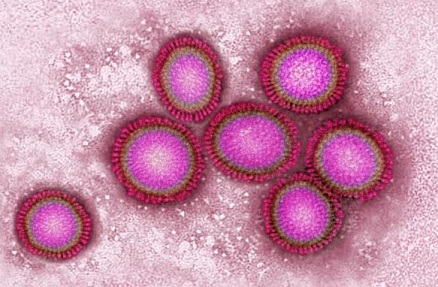A new discovery - Influenza virus suppresses cell death via TAK1 activation to aid replication
Nikhil Prasad Fact checked by:Thailand Medical News Team Jul 23, 2024 9 months, 5 days, 4 hours, 5 minutes ago
Influenza News: In a groundbreaking study, researchers have uncovered a surprising strategy used by the influenza A virus (IAV) to ensure its survival and replication within host cells. This
Influenza News report delves into the details of this discovery and its implications for future treatments and prevention of influenza infections. The study was conducted by a team from the College of Veterinary Medicine, Institute of Comparative Medicine, Yangzhou University, China.

Influenza virus suppresses cell death via TAK1 activation to aid replication
Understanding Influenza A Virus
Influenza A virus (IAV), belonging to the Orthomyxoviridae family, is known for causing seasonal flu epidemics. The two prevalent subtypes, H1N1 and H3N2, are responsible for hundreds of thousands of deaths annually. During the 2009 influenza pandemic, the virus claimed between 150,000 and 600,000 lives. Highly pathogenic strains like H5N1 and its derivatives can cause severe and often fatal infections in humans.
The IAV rapidly replicates within bronchial and alveolar epithelial cells, leading to cell death through various mechanisms such as apoptosis, necroptosis, and pyroptosis. One of the viral proteins, PB1-F2, targets mitochondria, initiating the cell's self-destruct process. However, this article explores new findings that show how IAV can also inhibit cell death to promote its replication.
Key Findings of the Study
The researchers focused on understanding how IAV infection influences cell death in murine alveolar epithelial cells (LET1) and murine fibroblastoma cells (L929). They discovered that IAV infection induces the phosphorylation of TAK1 (Transforming growth factor-beta-activated kinase 1), a crucial enzyme in cell signaling pathways.
TAK1's Role in Suppressing Cell Death
TAK1 activation was found to play a significant role in suppressing cell death. The study showed that inhibiting TAK1 using a specific inhibitor, 5Z-7-Oxazoline (5Z), significantly enhanced apoptosis (programmed cell death) and necroptosis (inflammatory cell death) in infected cells. This was evidenced by increased cleavage of proteins associated with cell death, such as PARP, caspase-8, and caspase-3.
Further investigations revealed that TAK1 activates IKK (I-kappa-B kinase), which in turn phosphorylates RIPK1 (Receptor-interacting serine/threonine-protein kinase 1) at specific sites, preventing its activation and subsequent cell death. In simpler terms, TAK1 works to keep RIPK1 in check, thereby preventing the infected cells from dying too soon and allowing the virus more time to replicate.
Different Pathways in Different Cells
The study also highlighted that IAV-induced cell death mechanisms differ between cell types. In fibroblastoma cells (L929), IAV induces cell death through a pathway involving RIPK1 and RIPK3, while in alveolar epithelial cells (LET1), the virus-induced cell death mainly through RIPK1 and a
minor contribution from RIPK3.
Role of ZBP1 and RIPK3
ZBP1 (Z-DNA-binding protein 1) was identified as a critical player in IAV-induced cell death. ZBP1 interacts with viral RNA and activates RIPK3, leading to necroptosis. Interestingly, while RIPK3 is essential for necroptosis, it is not required for apoptosis in IAV-infected cells. This finding contrasts with previous studies on mouse embryonic fibroblasts (MEFs), where both RIPK1 and RIPK3 are involved in virus-induced cell death.
Impact of TAK1 Inhibition in Mice
The researchers extended their studies to mice infected with the H1N1 virus. They found that TAK1 inhibition using 5Z treatment enhanced cell death in the lungs of infected mice but did not significantly reduce virus replication. The treatment slightly decreased the inflammatory response in the lungs and prolonged the survival of the infected mice.
Implications and Future Directions
This study provides crucial insights into how IAV manipulates host cell death pathways to its advantage. Understanding these mechanisms opens up potential avenues for developing new antiviral therapies that target TAK1 or related pathways to enhance cell death in infected cells, thereby limiting virus replication.
Moreover, the findings underscore the complexity of virus-host interactions and the need for further research to explore how different cell types respond to viral infections. Future studies could investigate the role of TAK1 and related pathways in other viral infections and explore potential therapeutic interventions.
Conclusion
The discovery that IAV suppresses cell death to aid its replication highlights a sophisticated survival strategy employed by the virus. By activating TAK1, the virus prevents premature cell death, allowing it more time to replicate and spread. These findings pave the way for new therapeutic approaches to treat influenza and potentially other viral infections.
The study findings were published in the peer-reviewed journal: Cell Communication and Signaling.
For the latest
Influenza News, keep on logging to Thailand Medical News.
https://link.springer.com/article/10.1186/s12964-024-01727-2
Read Also:
https://www.thailandmedical.news/news/new-anti-influenza-compounds-show-promise-in-battling-flu-strains
https://www.thailandmedical.news/news/trim-proteins-can-defend-against-influenza-viruses-and-coronaviruses
https://www.thailandmedical.news/news/passive-immunization-involving-avian-igy-anti-h5n1-antibodies-show-promise-against-influenza
